Matt Rees's Blog, page 17
May 12, 2011
FREE Omar Yussef short story: Damascus Trance
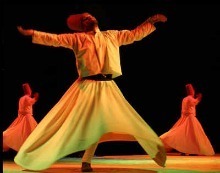 I've written this story as an immediate response to the murder and arrest of anti-government demonstrators all over Syria--and elsewhere in the Arab world. It’s a work of fiction based on the characters in my series of Palestinian crime novels. But real people are still being killed.
I've written this story as an immediate response to the murder and arrest of anti-government demonstrators all over Syria--and elsewhere in the Arab world. It’s a work of fiction based on the characters in my series of Palestinian crime novels. But real people are still being killed.DAMASCUS TRANCE
An Omar Yussef story
By Matt Rees
The crowd started to clear the wide, covered arcade of the Souk Hammidiyye even before the first shot. Omar Yussef saw a dread deeper than mere terror on the faces of the people hurrying out of the Ottoman market and into the alleys around the Ummayyad Mosque. They look disgusted with themselves, he thought. They had started to believe they had the courage to walk toward trouble, not to flee from it.
Three reports from a rifle out beyond the old Hejaz Railway Station and a rustle of distant outrage, as if the crowd were an old man bothered by his grandchildren during a nap.
“It’s going down.” Khamis Zeydan caught Omar Yussef’s elbow and pulled him out of the sudden stream of the crowd. They sheltered on the step of a store that sold seeds and roots which promised to make a man potent.
“All these years it was we Palestinians who did the rioting,” Omar Yussef said. “Our first day in Damascus and it’s happening here."
A shot, this time closer, from al-Thawra Street, and one of the yellowed glass panes in the vaulted roof of the arcade shattered. Every face was stern and still, but someone must have been shouting because it seemed the crowd was born aloft and accelerated on a tide of noise.
The storekeeper reached for his shutter with a long hook. “I have to close, ustaz.” Omar Yussef moved off the step and the metal rolled down. He glanced at the merchant. He was about Omar Yussef’s age, nearing sixty, and something about his high cheekbones was familiar despite his frothy white beard. As the storekeeper knelt to snap the padlock, the edge of the crowd jostled him, and as soon as the key was out he was on his feet and swept away.
A whirlpool of panic broke around Omar Yussef and Khamis Zeydan, pressing them between the chests and backs and shoulders of the men around them so that their feet barely connected with the ground. They slipped powerless from one set of bodies to another, exchanging the scents of different sweats and wondering at the pointless projection of angry voices like dogs joining a starlight chorus.
When the crowd spat them out into an alley, Khamis Zeydan lit a Rothman’s. “I haven’t run that far since we were in University.”
“Let’s hope it’s the only part of our student life that’s repeated at this reunion,” Omar Yussef said. “You know how I was back then.”
Read the rest of this story on my blog The Man of Twists and Turns.
Published on May 12, 2011 07:01
•
Tags:
anti-government-demonstrations, arab-awakening, arab-democracy, arab-spring, crime-fiction, damascus, damascus-trance, free-story, middle-east, mystery-story, omar-yussef, palestine, palestinians, pro-democracy-demonstrations, short-story, syria
May 10, 2011
Literary Review: MOZART'S LAST ARIA 'lively, well-researched, very clever'
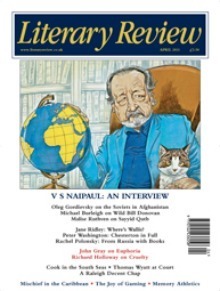 In the current edition of London's Literary Review, Jessica Mann leads her roundup of new crime novels with this praise for MOZART'S LAST ARIA, my historical thriller about the great composer's death: "Matt Rees has drawn a lively portrait of eighteenth-century Vienna and of characters whose names now live only because of their connection with the composer. This novel is well-researched, very clever and written in clean, suitably formal language...This is an even better mystery novel than the author's prize-winning series about the Palestinian detective Omar Yussef--and that's saying a lot."
In the current edition of London's Literary Review, Jessica Mann leads her roundup of new crime novels with this praise for MOZART'S LAST ARIA, my historical thriller about the great composer's death: "Matt Rees has drawn a lively portrait of eighteenth-century Vienna and of characters whose names now live only because of their connection with the composer. This novel is well-researched, very clever and written in clean, suitably formal language...This is an even better mystery novel than the author's prize-winning series about the Palestinian detective Omar Yussef--and that's saying a lot."
Published on May 10, 2011 00:24
•
Tags:
crime-fiction, historical-fiction, historical-thriller, literary-review, middle-east, mozart-s-last-aria, nannerl-mozart, omar-yussef, palestine, palestinian, reviews, vienna, wolfgang-amadeus-mozart, wolfgang-mozart
May 8, 2011
The Reverse Orientalist: Kamal Abdel-Malek’s Writing Life Interview
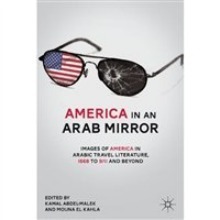 When Kamal Abdel-Malek was a young student, he chose to study outside the Arab world, eventually becoming a professor at Brown and Princeton Universities in the US. It was the first step in the physical and intellectual journeys of this intriguing Egyptian writer. Born in Alexandria and now a teacher of Arabic literature at the American University in Dubai, Abdel-Malek’s latest publication (available in English) is perhaps his most important, because it answers many of the questions Westerners asked themselves about the Arab world since the 9/11 attacks almost a decade ago. Abdel-Malek’s technique is an unusual and compelling one, because instead of seeking to explain how Arabs are, in America in an Arab Mirror: Images of America in Arabic Travel Literature, 1668 to 9/11 and Beyond he shows how we look to them. It’s a reversal of what the Palestinian intellectual Edward Said noted in Westerners writing about the Middle East: When you read the perceptions of Arab writers about Western society, it shows as much about the Arab writer as it does about the country he’s observing. Kamal took time to explain more about this vitally important book and to talk about his life as a writer. Demonstrating his originality as a thinker, he’s also the first writer I’ve interviewed on this blog to give due credit to Dan Brown.
When Kamal Abdel-Malek was a young student, he chose to study outside the Arab world, eventually becoming a professor at Brown and Princeton Universities in the US. It was the first step in the physical and intellectual journeys of this intriguing Egyptian writer. Born in Alexandria and now a teacher of Arabic literature at the American University in Dubai, Abdel-Malek’s latest publication (available in English) is perhaps his most important, because it answers many of the questions Westerners asked themselves about the Arab world since the 9/11 attacks almost a decade ago. Abdel-Malek’s technique is an unusual and compelling one, because instead of seeking to explain how Arabs are, in America in an Arab Mirror: Images of America in Arabic Travel Literature, 1668 to 9/11 and Beyond he shows how we look to them. It’s a reversal of what the Palestinian intellectual Edward Said noted in Westerners writing about the Middle East: When you read the perceptions of Arab writers about Western society, it shows as much about the Arab writer as it does about the country he’s observing. Kamal took time to explain more about this vitally important book and to talk about his life as a writer. Demonstrating his originality as a thinker, he’s also the first writer I’ve interviewed on this blog to give due credit to Dan Brown.How long did it take you to get your latest book published?
Two years. America in an Arab Mirror was published in April by Palgrave Macmillan in New York.
Would you recommend any books on writing?
Yes, books like these are helpful: On Writing by Stephen King, Break into Fiction, First Draft by Buckham and Love, and of course the classic, The Elements of Style by Strunk and White.
What’s a typical writing day?
I teach during the day so the only time available is either early in the morning or late in the evening. The best time is in the morning, especially when I wake up after a good night sleep.

Plug your book. How would you describe what it’s about? And of course why’s it so great?
America in an Arab Mirror: Images of America in Arabic Travel Literature, 1668 to 9/11 and Beyond deals with Arab-American relations, cross-cultural communication, and cultural understanding in general. The New York Times published a good review of it on April 21, 2011. My interest in Arab-American encounters in history, literature, and the arts started over a decade ago. The accounts of Arab travelers to America have always fascinated me. I widely researched the topic and had opportunities to read papers on it at Princeton and Dartmouth where I greatly benefited from the comments and the questions posed by colleagues in the field of Arabic and Middle Eastern studies. A question that was raised by a Princeton Arabist after one of my talks on the topic was whether Arab writings on America could be regarded as a case of Occidentalism, a counter-Orientalism of sorts. In some ways this book is a reversal of what Edward Said described as the West’s Orientalist view of the East. One could say that its stories are an Arab way of saying, “We, too, can subjugate you, Westerners, to our tourist, voyeuristic gaze.”
What’s your favorite sentence in all literature, and why?
If the question is about “favorite lines” instead of “favorite sentence” then I would mention, without hesitation, the evocative lines uttered by Macbeth upon receiving the news of his wife’s death.
Life's but a walking shadow, a poor player,
That struts and frets his hour upon the stage,
And then is heard no more. It is a tale
Told by an idiot, full of sound and fury,
Signifying nothing.
Macbeth Act 5, scene 5
What’s the best descriptive image in all literature?
But let there be spaces in your togetherness and let the winds of the heavens dance between you. Love one another but make not a bond of love: let it rather be a moving sea between the shores of your souls. -- Khalil Gibran
The teacher who is indeed wise does not bid you to enter the house of his wisdom but rather leads you to the threshold of your mind. -- Khalil Gibran
Who’s the greatest stylist currently writing?
In Arabic I must mention Yusuf Idris, the greatest short story writer and playwright. In Arabic he employs the different register of modern Arabic and the very evocative expressions of the everyday spoken Egyptian colloquial. In my opinion he, not Naguib Mahfouz, should have received the Nobel Prize for Literature. Outside the Arab world one can mention Gabriel García Márquez.
Read the rest of this post on my blog The Man of Twists and Turns.
Published on May 08, 2011 06:38
•
Tags:
9-11, america-in-an-arab-mirror, arab-world, arab-writers, egypt, egyptian-writer, interviews, kamal-abdel-malek, middle-east, writers, writing-life
May 4, 2011
Guest Blogger Wolfgang Mozart: I always said I was poisoned
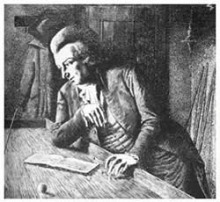 At last. It took 220 years, but finally someone has told my story. I always said I was poisoned.
At last. It took 220 years, but finally someone has told my story. I always said I was poisoned.MOZART’S LAST ARIA came out this week in the UK. It’s a historical thriller by the British writer Matt Rees. I don’t mind that the Mozart of the title is my sister Nannerl – I always thought she deserved more recognition than she got. No, I don’t mind that at all, because Rees confirms for me what I felt sure of all along: I was poisoned.
I told my wife that I was sure of this six weeks before I died. It was October 1791. We were in the Prater Gardens in Vienna. I sat on a bench and said, “Constanze. I know I’ve been poisoned. I’m to be a sacrifice.”
She told me I was being a hypochondriac and that I ought to buck up from this melancholy. I pointed out that a hypochondriac thinks he’s ill. She couldn’t think of a word for someone who thinks he’s a murder victim.
I tried hard to cheer up. Tried so hard, even though I felt like I was shitting oranges every time I smiled (Readers of my collected letters will remember my penchant for naughty phrases like that. I haven’t grown out of them even after two centuries in the grave.) I did cheer up here and there, but soon enough I’d feel the pain in my kidneys and I knew they had done for me…
Who’re they? You’ll have to read MOZART’S LAST ARIA to find out. But Rees has taken advantage of all the new historical research which shows what I had been up to. And how dangerous it was.
You see, I wasn’t just a musician. Certainly I wasn’t the buffoon some people like to think I was, either. No, I was committed to the new ideas of equality and brotherhood promulgated by the Enlightenment. That was prettyrisky in Vienna back then. After all, the Enlightenment provided the ideas behind the French Revolution, and in Paris our Emperor’s sister Marie Antoinette was about to pay the price of equality.
I was a member of a lodge of Freemasons. The Emperor had made us more or less illegal. Lots of my brethren quit the Masons. I started writing songs for the lodge meetings and, well, I’m not giving away too much about Rees’s novel when I say that I had an idea for a new Masonic lodge, even though the Emperor had decreed there be no new lodges and the Imperial Secret Police was breathing down the Masons’ necks.
Read the rest of this post on my blog The Man of Twists and Turns.
Published on May 04, 2011 22:43
•
Tags:
crime-fiction, enlightenment, freemasons, guest-blogger, historical-fiction, historical-thriller, mozart-s-last-aria, nannerl-mozart, prater-gardens, vienna, wolfgang-amadeus-mozart, wolfgang-mozart
May 3, 2011
The Music Behind my Mozart Novel
 The best reason I have for writing a novel about Mozart must surely be that I love his music. Other elements contribute, including my fascination with his neglected sister and the growing historical research which I believe points toward his murder. But the music must be at the center of the novel itself.
The best reason I have for writing a novel about Mozart must surely be that I love his music. Other elements contribute, including my fascination with his neglected sister and the growing historical research which I believe points toward his murder. But the music must be at the center of the novel itself.I’ve played music all my life. But after my initial music lessons I eschewed the playing of classical music – no more Etudes by Heller for me. I’ve been a guitarist and bassist in various rock bands. Less sexily, I played glockenspiel in my high school band.
So for MOZART’S LAST ARIA, my new historical thriller in which Wolfgang’s sister Nannerl investigates his death in Vienna, 1791, I decided to learn to play piano. This showed me two things: first that I’m not much good on the piano; and second a way to see inside Wolfgang’s music, because the piano study made me think more deeply about musical theory than rock guitar. (Surely THAT doesn’t surprise anyone, but it was worth demonstrating anyhow.)
My guide in this was my dear friend Orit Wolf, a fabulous concert pianist who lives in Jaffa (You can see her dressed up as Nannerl and hear her version of Mozart’s Fantasia in D on this video). Orit’s probably best known for her heartfelt interpretations of romantic composers. When she plays Chopin or Schubert, I challenge you to stay on your feet, so emotional and breathtaking is it. But her insights into Mozart are stupendous. Our discussion of Wolfgang’s piano sonata in A minor I remember in particular. It gave me the idea of building the entire novel around the mood and structure of that piece.
Orit also introduced me to some of the techniques great musicians use when they prepare for a performance. For example, she told me that when she first looks at a piece for a performance she decides what color the music makes her think of. Before each performance, she’ll visualize that color and it will create a mood in her, and in turn that mood will be reflected in the music as she plays it. It isn’t just about hitting the right keys.
I had a similar talk with the great conductor Zubin Mehta (in which he was very frank about the lack of worth of certain composers who’ll remain nameless). He was very clear about who the greatest of them all is. “I’d find it very hard to live without Mozart,” he told me.
Read the rest of this post on my blog The Man of Twists and Turns.
Published on May 03, 2011 23:13
•
Tags:
classical-music, crime-fiction, don-giovanni, estates-theater, historical-crime, historical-fiction, historical-thriller, mozart, mozart-s-last-aria, music, nannerl-mozart, orit-wolf, prague, south-africa, staatsoper, the-magic-flute, vienna, wolfgang-amadeus-mozart, wolfgang-mozart, zubin-mehta
May 2, 2011
Mozart Scene of the Crime
 Historical novelists recreate the emotions and events of distant times. It helps if they can use real places that still exist. In the case of MOZART’S LAST ARIA, I was able to set much of the action in streets and buildings where Mozart lived and worked – and where you can still visit.
Historical novelists recreate the emotions and events of distant times. It helps if they can use real places that still exist. In the case of MOZART’S LAST ARIA, I was able to set much of the action in streets and buildings where Mozart lived and worked – and where you can still visit.In my historical thriller, the composer’s sister Nannerl comes to Vienna to investigate her suspicion that Wolfgang was poisoned. One of the men who helps her is Baron Gottfried van Swieten, an important patron of her brother. Swieten was Imperial Librarian, and you can see the majesty and learning of that time arrayed on the shelves of the Prunksaal, the great library attached to the Hofburg, the Emperors’ palace in central Vienna.
The library is open to the public, but you’ll rarely find more than five or six other visitors there at one time – most people are shuffling with the crowds through the Emperor’s rooms down the way. It’s a gem hidden in rather plain site.
The house where Mozart died was destroyed some time ago (though you can visit a museum in the house where he wrote The Marriage of Figaro nearby). There’s a department store there now, on Rauhenstein Lane. But if you stand with your back to the spot, you can look to your left, your right, and in front of you, and you’ll see just what Wolfgang would’ve seen – except there’ll be less horse manure on the streets. Much of central Vienna remains just as it was in Mozart’s time.
Despite its destruction, I was able to describe the interior of Mozart’s home quite fully, however. There have been a number of academic theses written about the furniture and layout of the apartment. Yes, really. (Some years ago, the startling discovery was made that not only did he have two windows on the front of his studio, but he also had another one on the side. You get a Ph.d. for this stuff, you know. But anyway I’m very grateful to those dedicated Mozartians.)
You can look at a photo tour of other Mozart sites and locations from MOZART’S LAST ARIA in Vienna on my website.
Read the rest of this post on my blog The Man of Twists and Turns
Published on May 02, 2011 23:36
•
Tags:
amadeus, austria, classical-music, crime-fiction, czech-republic, historical-crime, historical-fiction, mozart-s-last-aria, nannerl-mozart, prague, vienna, wolfgang-amadeus-mozart, wolfgang-mozart
Amadeus, Murder and the real Mozart
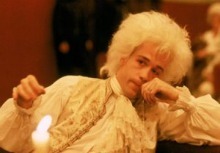 The long wait for a successor to Amadeus is over. In fact, my new novel MOZART’S LAST ARIA answers questions about the great composer’s death that are far more deeply rooted in historical research than Peter Shaffer’s nonetheless terrific play.
The long wait for a successor to Amadeus is over. In fact, my new novel MOZART’S LAST ARIA answers questions about the great composer’s death that are far more deeply rooted in historical research than Peter Shaffer’s nonetheless terrific play.Shaffer, whose play was first performed in 1979 and filmed by Milos Forman in 1984, proposed court composer Salieri as the man who killed Mozart at the age of 35. (Actually, Shaffer’s play was largely based on a play from the 1830s by the Russian poet Alexander Pushkin.) The truth behind the Salieri murder myth is that when the court composer claimed to have killed Mozart, he was incarcerated in a lunatic asylum. Once he regained his sanity, however, he refuted the story as something he had made up in his madness.
My novel also rescues Wolfgang from the popular perception (rooted in Amadeus) that he was some kind of giggling buffoon who just happened to write angelic music. Far from it, Wolfgang’s letters and his friends’ recollections show that he was a deep thinker who had great admiration for Enlightenment ideals (something that would’ve put him in jeopardy with the Emperor’s spies much greater than the risk he faced from Salieri’s jealousy). Clearly he was excitable immediately after musical performances, but then The Rolling Stones have been known to drop tv sets out of tenth-floor hotel rooms to let off steam and they’re no Mozarts.
The Wolfgang I’ve come to know from my research and from an intense listening of his music was no fool. He was one of the great minds of history, and I hope my novel will rescue his reputation as an intellectual whose concern for his fellow man was rooted deep in a profoundly caring, warm personality.
As for his murder, Mozart believed he was being poisoned. Six weeks before he died, he was promenading in the Prater Gardens of Vienna with his wife Constanze. He told her he had been poisoned, that he was to be sacrificed and knew he would die. His wife tried to cheer him up, but the conviction that he had been poisoned remained with him until his death in early December 1791.
The premise of my novel MOZART’S LAST ARIA is that Nannerl, Wolfgang’s gifted sister, learns of her brother’s belief that he had been poisoned and travels to Vienna to find out the truth. (In fact, she never went to Vienna after his death, though she lived a further 37 years in and around Salzburg.)
Read the rest of this post on my blog The Man of Twists and Turns.
Published on May 02, 2011 00:23
•
Tags:
amadeus, crime-fiction, historical-crime, historical-fiction, milos-forman, movies, mozart-s-last-aria, nannerl-mozart, peter-shaffer, salieri, tom-hulce, wolfgang-amadeus-mozart, wolfgang-mozart
May 1, 2011
MOZART'S LAST ARIA: the video
For today's release of my new historical crime novel MOZART'S LAST ARIA in the UK, take a look at this two-minute video introducing the book. It features my son dressed as Little Mozart, because I'm even more proud of him than I am of the book... Watch more videos about the book.
Published on May 01, 2011 00:32
•
Tags:
book-video, crime-fiction, historical-crime, historical-fiction, mozart, mozart-s-last-aria, mozart-s-sister, nannerl-mozart, video, vienna, wolfgang-mozart
My Mozart novel and the intifada
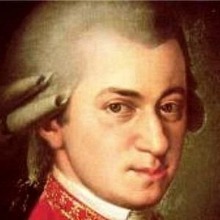 If there had never been a Palestinian intifada, I might never have written my novel about the death of Mozart, MOZART’S LAST ARIA, which is published today in the UK by Corvus.
If there had never been a Palestinian intifada, I might never have written my novel about the death of Mozart, MOZART’S LAST ARIA, which is published today in the UK by Corvus.Of course, 4,000 people would also be alive who are now dead. In the course of writing about that destruction between 2000 and 2006, I saw some terrible things, experienced some frightful emotions, and internalized shocking facts about the world around me. It would’ve been easy to become depressed or to descend further into the post-traumatic stress disorder that nipped at my mind quite frequently.
Mozart saved me from that. I used to listen to his music in my armored car as I drove through the dangerous roads of the West Bank or on my iPod as I huddled in my Gaza hotel after a day dodging through refugee camps where Palestinians and Israelis were fighting it out. The Maestro’s great works soothed me, enabled me to achieve an emotional calm, when all around me was horror and chaos.
I didn’t use the music to ignore what was happening. Rather the music kept me open to the world around me. I didn’t have to shut out the horror; I could watch it and try to understand it. Because the great Wolfgang was sending me musical signals about the beauty and peace that exists at the core of every man. We only need listen to Mozart to know that he speaks to this part of us, and his immense popularity and immediacy is a sign that it truly is something we all possess.
There’s a good deal of research about Mozart’s music and its phenomenal ability to calm all kinds of disorders and, certainly, to soothe us when we’re stressed. Kids with attention-deficit disorder have been shown to concentrate better if Mozart is playing in their classroom. Epileptics are less likely to have seizures if they’ve been listening to Mozart (an element I worked into the plot of MOZART’S LAST ARIA.)
I found the last six symphonies were the most relaxing, and the piano sonatas. I think that’s because there’s an even greater clarity in these pieces than in some of Mozart’s other work. It’s also in these pieces that he hits the sonic frequencies particular to him which appear to be behind the curative effect of his music – frequencies scientists have found NOT to occur in other great composers like Beethoven or Brahms. (Listen to those other guys and it’ll be good for you, but it won’t really calm you and it certainly doesn’t have the same effect on A.D.D. or epileptics.)
Read the rest of this post on my blog The Man of Twists and Turns.
Published on May 01, 2011 00:28
•
Tags:
book-launch, crime-fiction, gaza, historical-crime, historical-fiction, intifada, ipod, israel, israelis, middle-east, mozart-s-last-aria, mozart-s-sister, murder-mystery, nannerl-mozart, palestinians, west-bank, wolfgang-amadeus-mozart, wolfgang-mozart
April 28, 2011
The Prestigious Matt Rees International Literary Prizes
 I have observed in this space before that author bios tend to be short on interesting detail and overfull of prize lists. Philip Roth, for example, doesn’t seem to exist, according to his bio. He doesn’t live anywhere, nor was he born. He simply receives prizes. This week I’m reading a very good historical novel by a writer who shall remain nameless. Perhaps it’s best that she remain nameless, because her name exists, according to her bio, only as a receptacle for prizes. Seven prizes are listed, plus four for which she was shortlisted. I note that she was a nominee for the Frank O’Connor International Short Story Award (I’m told this is a big deal, but the name just smacks of a pub quiz in honor of an old boy who’s always in the snug nursing a pint of bitter and looking half dead). It occurred to me that writers might set up such a prize and award it to themselves. I’ve already won a couple of literary prizes, but had I not done so, I’d invent a prize and bestow it upon myself so that I could refer to myself as a prize-winning author. Now I’ve decided to do the same thing for my colleagues by handing out prizes and, more importantly, incorporating the word “Prestigious” into the name of the prize, assuming that most readers will think this is an adjective to describe the prize rather than part of the prize title itself. This is genuinely more and more important in an age when it’s difficult for many authors to get attention, because newspapers and magazines review fewer books, if any, and conventional media publicity avenues are swallowed whole by the Patricia Cornwells and Salman Rushdies. Over the next couple of weeks, I’ll be accepting your nominations for the following prize categories. (Note, authors are welcome to nominate themselves. Because that’s the irreverent point. But readers can participate, too.) Please add your nominations to the comments section of the blog and note that I won’t mind if you nominate books that weren’t written in the last year, because most of the books you think are new are really a few years old; who can pay attention to all the new releases, right?
I have observed in this space before that author bios tend to be short on interesting detail and overfull of prize lists. Philip Roth, for example, doesn’t seem to exist, according to his bio. He doesn’t live anywhere, nor was he born. He simply receives prizes. This week I’m reading a very good historical novel by a writer who shall remain nameless. Perhaps it’s best that she remain nameless, because her name exists, according to her bio, only as a receptacle for prizes. Seven prizes are listed, plus four for which she was shortlisted. I note that she was a nominee for the Frank O’Connor International Short Story Award (I’m told this is a big deal, but the name just smacks of a pub quiz in honor of an old boy who’s always in the snug nursing a pint of bitter and looking half dead). It occurred to me that writers might set up such a prize and award it to themselves. I’ve already won a couple of literary prizes, but had I not done so, I’d invent a prize and bestow it upon myself so that I could refer to myself as a prize-winning author. Now I’ve decided to do the same thing for my colleagues by handing out prizes and, more importantly, incorporating the word “Prestigious” into the name of the prize, assuming that most readers will think this is an adjective to describe the prize rather than part of the prize title itself. This is genuinely more and more important in an age when it’s difficult for many authors to get attention, because newspapers and magazines review fewer books, if any, and conventional media publicity avenues are swallowed whole by the Patricia Cornwells and Salman Rushdies. Over the next couple of weeks, I’ll be accepting your nominations for the following prize categories. (Note, authors are welcome to nominate themselves. Because that’s the irreverent point. But readers can participate, too.) Please add your nominations to the comments section of the blog and note that I won’t mind if you nominate books that weren’t written in the last year, because most of the books you think are new are really a few years old; who can pay attention to all the new releases, right?The Prestigious Matt Rees International Prize for a Book I Bought Because It Had a Nice Cover (Kindle readers, please ignore.)
The Prestigious Matt Rees International Prize for a Book I Bought Because It Was Nominated for Prizes But Ended up Wondering What the Judges Were Thinking
The Extremely Prestigious Matt Rees International Prize for the Best Book by Matt Rees This Year
The Prestigious Matt Rees International Prize for the Best Book That’s Kind of Like “The Kite Runner”
Read the rest of this post on my blog The Man of Twists and Turns.
Published on April 28, 2011 09:46
•
Tags:
literary-prizes, patricia-cornwell, philip-roth, salman-rushdie, writers



